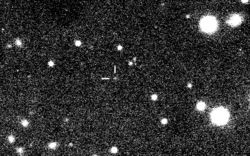Pasithee (moon) facts for kids

Discovery images of Pasithee by the Canada-France-Hawaii Telescope in December 2001
|
|
| Discovery | |
|---|---|
| Discovered by | Scott S. Sheppard David C. Jewitt Jan T. Kleyna |
| Discovery site | Mauna Kea Observatory |
| Discovery date | 11 December 2001 |
| Designations | |
| MPC designation | Jupiter XXXVIII |
|
Named after
|
Πασιθέα Pāsithea |
| S/2001 J 6 | |
| Adjectives | Pasithean |
| Orbital characteristics | |
| Epoch 17 December 2020 (JD 2459200.5) | |
| Observation arc | 16.29 yr (5,949 days) |
| 0.1535315 AU (22,967,990 km) | |
| Eccentricity | 0.2097026 |
| –711.12 d | |
| 71.98760° | |
|
Mean motion
|
0° 30m 22.488s / day |
| Inclination | 164.72796° (to ecliptic) |
| 49.07994° | |
| 331.51895° | |
| Satellite of | Jupiter |
| Physical characteristics | |
|
Mean diameter
|
2 km |
| Albedo | 0.04 (assumed) |
| 23.2 | |
| 16.8 | |
Pasithee, also known as Jupiter XXXVIII, is one of the many moons orbiting the giant planet Jupiter. It is called an irregular satellite because it has an unusual orbit. Pasithee was found by a team of astronomers led by Scott S. Sheppard in 2001. When it was first discovered, it was given the temporary name S/2001 J 6.
Contents
About Pasithee: A Small Moon
Pasithee is a very small moon, only about 2 kilometers (1.2 miles) wide. That's roughly the size of a small town! It travels around Jupiter quite far away, at an average distance of about 23,307,000 kilometers (14,482,000 miles).
How Does Pasithee Orbit Jupiter?
Pasithee takes about 711 days to complete one trip around Jupiter. This is a bit less than two Earth years. Its orbit is also retrograde, which means it moves in the opposite direction compared to Jupiter's rotation and most of its other moons.
The moon's orbit is also tilted quite a lot, about 166 degrees compared to the ecliptic (the plane where Earth orbits the Sun). It also has an eccentric orbit, meaning its path around Jupiter is more like an oval than a perfect circle.
Naming Pasithee
Pasithee got its official name in August 2003. It is named after Pasithee, a figure from Greek mythology.
Who Was Pasithee in Mythology?
In Greek myths, Pasithee was one of the Charites, also known as the Graces. These goddesses represented charm, beauty, nature, human creativity, and fertility. They were believed to be the daughters of Zeus (who is like the Roman god Jupiter) and Eurynome. Pasithee is also known as Aglaea and was married to Hypnos, the god of sleep.
Pasithee's Family: The Carme Group
Pasithee is part of a group of moons called the Carme group. This group includes several irregular moons that orbit Jupiter in a similar way.
What is the Carme Group?
The moons in the Carme group are all retrograde, meaning they orbit Jupiter in the opposite direction. They also orbit at a similar distance from Jupiter, usually between 23 and 24 million kilometers. Their orbits are also tilted at about 165 degrees. Scientists believe that these moons might have once been a single, larger object that broke apart after a collision.
Images for kids
See also
 In Spanish: Pasítea (satélite) para niños
In Spanish: Pasítea (satélite) para niños
 | Janet Taylor Pickett |
 | Synthia Saint James |
 | Howardena Pindell |
 | Faith Ringgold |


